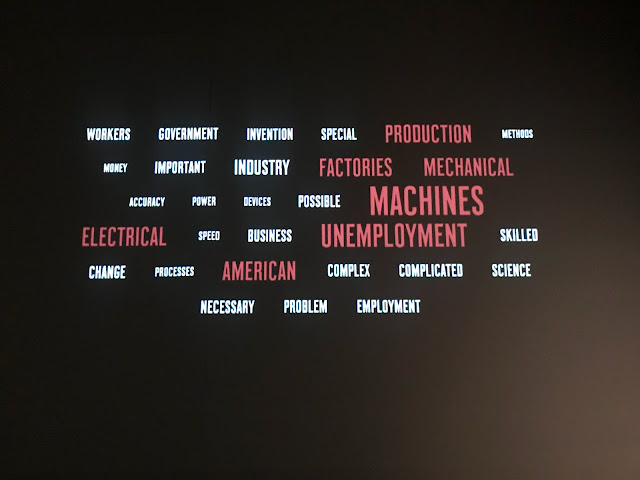Technology perspectives, then and now
One of the exhibits on my latest visit to the de Young Museum was about the "Cult of the Machine", an exploration about man's fascination with automation, robotics, and technology, as expressed in art.
One of the displays in the exhibit caught my attention because it was all about what technology meant to people in the 1920s and 1930s (during the art deco movement), and in the late 2010s (not sure what art period we're now on). It's fascinating because it's a reflection of how people's views about technology have changed.
For example, the early 20th century was filled with commodity businesses (mass production and factories); technology, therefore, was associated closely with production. There seemed to be a clear distinction between man and machine; oftentimes, people viewed machines as competition for their jobs. It's all about efficiency, speed, and processes back then... there's a big emphasis on products.
For the next 100 years, technology slowly became part of everyday life; or at least, people seemed to have stopped seeing a clear distinction between their lifestyles and jobs and technology. In fact, more words that are associated with man-and-machine interactions have appeared (e.g., interconnected, immersive, pervasive). Many words seem to suggest technology's ironic capacity to make people feel connected and isolated at the same time; it is democratic and inequitable as well. Technology has gone inside the home, making it disruptive, pervasive, and addictive. A lot of descriptions; it seems like technology has become less tangible. Perhaps, it's because technology has become virtual (the mechanical technologies of old are no longer science wonders today).
What has not changed in the last century is the view that technology is complex and is about invention and innovation.
I've been coming across artificial intelligence articles and news clips more often after I moved to the Bay Area. Some of the most controversial statements I've read came from people who seem to live in their own tech bubbles, detached from the realities of the world and preaching to the congregation... but may perhaps be proven correct once AI technology has become an everyday part of people's lives.
For example, Google CEO Sundar Pichai has been quoted as saying that AI is more important (profound is the word he used) than electricity and fire. On the other hand, Y Combinator President Sam Altman posits that AI will increase global wealth and people will need to figure out how to find meaning. I ended up shaking my head in disbelief after reading.
If I were living in a developing country, I'd say that their statements are so "first world"; however, I currently live in a developed country where I also see problems that I've seen while growing up in a developing country (e.g., poverty, homelessness, malnutrition)... so I'd say that maybe their statements are currently true—or becoming true—in regions where power interruptions are uncommon (because AI won't run if there's no electricity, right?) and where populations are fulfilling the top of Maslow's hierarchy of needs (self-actualisation; finding meaning). For the rest of the world, where the vast majority of people struggle to survive in the face of climate change, inflation, and unemployment, perhaps their statements will not come to fruition until many years later. However, it is also these very regions which will become AI's first adopters because they really need the technology boost.
Who knows, right? The word cloud contents will probably be populated by what people think about AI if another survey will be conducted in, say, 20 years.




Comments
Post a Comment
Thank you for dropping by!
Before moving on, please share your thoughts or comments about the post. :)
Thanks again!